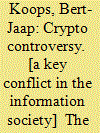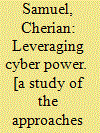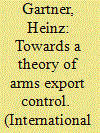| Srl | Item |
| 1 |
ID:
001949


|
|
|
|
|
| Publication |
The Hague, Kluwer Law International, 1999.
|
| Description |
xvi,285p.
|
| Standard Number |
9041111433
|
|
|
|
|
|
|
|
|
|
|
|
Copies: C:1/I:0,R:0,Q:0
Circulation
| Accession# | Call# | Current Location | Status | Policy | Location |
| 042972 | 303.4833/KOO 042972 | Main | On Shelf | General | |
|
|
|
|
| 2 |
ID:
182707


|
|
|
|
|
| Publication |
New Delhi, MP-IDSA, 2021.
|
| Description |
105p.pbk
|
| Series |
MP-IDSA Monograph Series no.;73
|
| Standard Number |
9789382169994
|
|
|
|
|
|
|
|
|
|
|
|
Copies: C:2/I:0,R:0,Q:0
Circulation
| Accession# | Call# | Current Location | Status | Policy | Location |
| 060110 | 303.4833/SAM 060110 | Main | On Shelf | General | |
| 060111 | 303.4833/SAM 060111 | Main | On Shelf | General | |
|
|
|
|
| 3 |
ID:
098467


|
|
|
|
|
| Publication |
2010.
|
| Summary/Abstract |
The Wassenaar Arrangement (WA) is a multilateral regime designed to control exports of conventional arms and dual-use goods and technologies to contribute to regional and international security and stability. Unlike traditional arms control and disarmament agreements WA is not legally binding. It has to rely on cooperation and voluntary compliance of the actors concerned - principally states and industries. For them the WA provides guidance for cooperation and compliance. The question is whether the actors involved are interested in complying with the guidelines. The article applies two IR theories to address this question, liberal institutionalism and realism. One argument of liberal institutionalism is that international institutions and regimes not only have a vital catalytic role to play in promoting cooperation among states, but they also develop synergetic effects and reinforce each other in the framework of effective multilateralism. In many ways this might well be the case, but the opposite is also true. The economic interests of member states and jealousy between them have long hampered cooperation among the various regimes that have been designed to act as the multilayered export control and non-proliferation system that all involved have agreed is necessary. But it is not only liberal institutionalism that fails to explain the behavior of states, international institutions and regimes. For realists, it is states' interests that matter, with common norms, rules and principles mattering less, if at all. But contrary to the realist argument, states do also support the general guidelines and best practices of the international institutions that have been created to avoid the destabilizing effects of the accumulation of certain categories of conventional arms and the proliferation of dangerous weapons. Neither realism nor liberal institutionalism is fully able to capture the complex relationship between the interests of individual countries and general principles and norms. The diplomatic delegations in multilateral fora have the difficult task of identifying the cumulative interests of the countries they represent. They have to support and reject cooperation with states and other export control regimes and institutions, often at the same time.
|
|
|
|
|
|
|
|
|
|
|
|
|
|
|
|